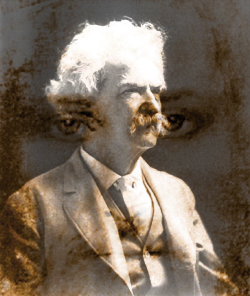|
Jesus, Mary and Josephina(continued) And then I think about Mark Twain and his writings on religion. In his book Europe and Elsewhere, the beloved author and humorist wrote in an essay, "Bible Teaching and Religious Practice," that:
Wow, if he'd said those things today, he'd get a lot of nasty e-mails. Is there no common sense, common ground? Nearly every religion believes in the ethics of reciprocity, known in the Christian world as the Golden Rule, values simply expressed as, "Do unto others as you would wish them do unto you." Now isn't that a mantra, religion, spiritual affirmation and bumper sticker we can all get behind? I stopped believing a long time ago in a vengeful god; after all, I can wreak havoc on myself just fine. But like the little girl who took her job seriously in her temporary role as the Blessed Virgin Mary, I still believe. I believe in a higher purpose, a higher power, something greater and more courageous than me, more accepting and content and loving. I believe in some of the tenants of most faiths. I believe in karma. I have no desire to come back in my next life as a cockroach or Pol Pot. The brilliant writer Madeleine L'Engle, renowned for her children's classic, A Wrinkle in Time, expressed it wonderfully when she wrote, "Why does anybody tell a story? It does indeed have something to do with faith," she said, "faith that the universe has meaning, that our little human lives are not irrelevant, that what we choose or say or do matters, matters cosmically." Or as Jesus said, "Do not be afraid any longer, but believe. Everything is possible to the one who believes." I can't be certain, because I've never heard from the gender-neutral
British voice again, but I think it would concur. |
